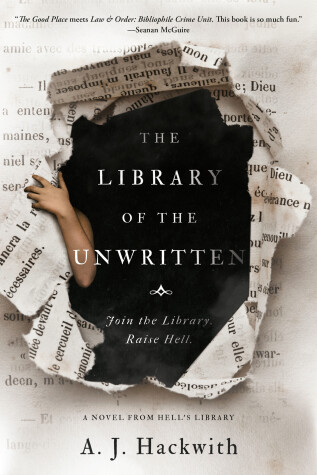Reviewed by nannah on
Content warnings:
- suicide
- overdose
- panic attack (on page)
- drowning
Representation:
- the main character is black and pansexual (the word is mentioned in actual dialogue)
- a secondary character is also black
- a secondary character has anxiety
Claire is the Librarian of the Unwritten Wing of Hell’s library, which holds stories that are unfinished or have only been thought up. Every so often, a book manifests as one of its characters and tries to escape -- like Hero, who not only breaks out but manages to find his author and influence her. Claire, her assistant Brevity, her demonic “co worker” and mentor Andras, and a newly made demon named Leto take a trip “topside” to persuade Hero back to his book.
Everything gets more complicated when their party is attacked by the angel Ramiel, who thinks they have part of a powerful tool that could help turn the tide in Heaven and Hell’s war. As an unwritten book, though, it falls under Claire’s protection, and she doesn’t want it to pass into either side’s hands.
As I said, I fell in love with the concept -- more so the unwritten library than Heaven and Hell being involved. I immediately loved the characters introduced early on: brusque and slightly cold Claire, cheerful Brevity, and nervous, unconfident Leto. Unfortunately, I don’t think they were given enough room to grow, as the plot and politics took over. But I understand that you have to prioritize.
However, I wish the book stayed with the unwritten library, expanding on concept and worldbuilding, instead of involving the drama and politics of the afterworlds. Things started to make less and less sense as the book moved forward -- the biggest one being how is Hell a neutral territory? Especially for the Unwritten Library, where each unwritten book is a power source for demons. I know it needed to be there for plot reasons, but it doesn’t make sense otherwise. I’m also not sure how the libraries even work. Does each afterworld have their own library? If so, why does Hell get the one where each book can be used as a source of power? There’s also an inter-world loan mentioned, but then the text says it’s discouraged. So other realms are discouraged to read an unwritten book? Would people in Heaven never be able to read unwritten books or books from other realms, whatever their libraries hold (I know the text also said people in Heaven would never want to read books, but that’s beside the point)?
There’s also the matter that every human (Christian) soul chooses what afterlife they end up in. I guess that’s a nice idea in theory, but you’d get a lot of awful people in Heaven who truly believe their decision is indisputable, and a lot of great people in Hell with low self confidence or with mental illnesses, which doesn’t seem fair.
After the halfway mark, too, the number of spelling and editing errors almost grows exponentially. The writing style becomes a lot more awkward--maybe the project became rushed with less time for edits? The villain also materializes into a very, very one-note antagonist, complete with monologuing!
The reader is also absolutely bombarded with foreshadowing -- to the point where any new turn the author wants to take is not only predicted but with a bit of eye rolling. We know who the traitor in the party’s midst is, we know exactly what relationships will form and how, how character arcs will play out, etc. This wouldn’t be an issue (after all, all stories have been told at least once) had everything else been executed well.
As it is, the concept of characters (from within the unwritten books) being labeled as heroes, damsels, or villains became boring and generic really fast, even though the book tries to break them out of those molds. The problem there, too -- in the specific example of Hero --, is that his personality (after he’s revealed to be a “Villain” type) is never really something one could call villainous. In fact, he never really does anything remotely villainous. If being crafty is all there is to be labeled a book villain, how many heroes does this make into villains? I’m sure someone could explain this better than I can, but I do appreciate A.J. Hackwith including runaway damsels of more than one gender who escaped their own misogynistic (or otherwise awful stories) to simply remove themselves from those plotlines. That’s a genius move ... up until they actually have an in-book scene that’s more than a brief introduction and all die.
For most of these it’s a matter of taste. I think this book is very creative, and though I may or may not pick up the sequel, I’ll definitely look into what else A.J. Hackwith writes.
Reading updates
- Started reading
- 16 October, 2021: Finished reading
- 16 October, 2021: Reviewed
